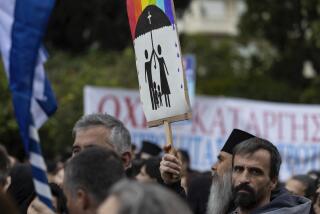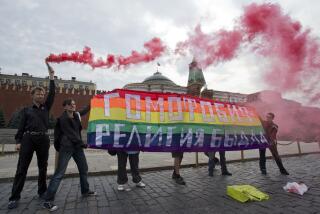Baltic States Move to Ease Church Curbs
- Share via
The Soviet republics of Estonia, Latvia and Lithuania are rewriting their laws on religion, a process that church leaders hope will loosen restrictions that have stunted church activities in the Baltic states for decades.
In at least one case--in Latvia--state officials are actively soliciting the opinions of church leaders, and observers in the United States believe the response of Soviet officials to the recommendations will test Soviet leader Mikhail S. Gorbachev’s policies of glasnost (openness) and perestroika (restructuring).
Rewriting of the religion laws comes at a time of general political upheaval in the Baltic states marked by increasingly aggressive calls for more autonomy from the Soviet bureaucracy. In late November Estonian political leaders asserted their independence from Moscow’s control, but the Soviet government quickly declared the Estonian policy invalid.
According to a dispatch from Lutheran World Information, church leaders in Latvia have been asked to give suggestions to the Council for Religious Affairs, the body that is preparing a proposal for religious reform that will eventually be presented to the republic’s Supreme Soviet for legislation.
List Submitted
The Evangelical Lutheran Church of Latvia, the largest religious group in the republic, has submitted a list of 26 recommendations to the Council centered on the principle that the interests of congregations should not be restricted to church affairs. Specifically, the church is asking that congregations be allowed to collect money and open their own bank accounts, enabling them to finance programs of social work. They also are asking to be allowed to have their own libraries containing Christian literature.
The Rev. Vilis Varsbergs, president of the tiny Chicago-based Latvian Evangelical Lutheran Church in America, said Christians in the Baltic states want to “liberate the church from being imprisoned in the four walls of their buildings.”
Enforcement of laws that are on the books--laws that govern religion in all of the Soviet republics--would mean, in effect, that Christians could do nothing beyond having religious services in their churches, Varsbergs explained.
Varsbergs, whose church was founded in 1975 and claims about 14,000 members, pointed to several recent developments in Latvia that he said bode well for the church.
School Experiment
State officials, he said, are currently experimenting with religious instruction in the public schools at the high school level.
Varsbergs said his church has been asked by the Latvian church to ship 20,000 copies of a Bible study curriculum developed for use in the United States. He also pointed to the “almost incredible” transformation of the Latvian press as a sign of hope. Now, Varsbergs said, people are able to read about the persecution of Christians and others--referred to by him as “crimes” and “black spots” in history--which took place during the Stalin era.
Varsbergs observed that the fuel that fires the Gorbachev reforms is not necessarily altruism but, rather, a recognition that economic reforms are crucial to the country’s well-being. “How sincere Gorbachev is I don’t know, but I think he’s smart enough to see where the problems lie,” Varsbergs said.
A hope of Latvians, he noted, is that the republic be made economically autonomous so that it could operate, in effect, as “the Hong Kong of the Soviet Union,” acting as a center of trade for the East and West.
‘No Significant Role’
Varsbergs said that, in addition to the Lutheran presence in Latvia, the Baptists are strong there. The Orthodox, he said, are small and appear to have “no significant role” in policy making.
In Estonia, there is also a significant Lutheran population, and the Orthodox are playing a more prominent role in the “reawakening” of the church.
Lithuania, Varsbergs said, has only a small Lutheran population, with Roman Catholics constituting the largest religious group.
More to Read
Sign up for Essential California
The most important California stories and recommendations in your inbox every morning.
You may occasionally receive promotional content from the Los Angeles Times.










